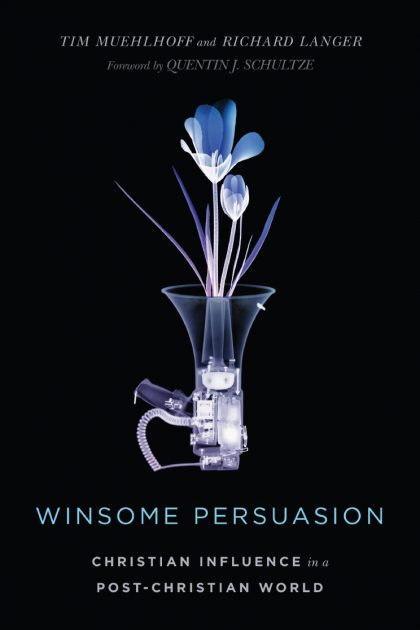
by Tim Muehlhoff and Richard Langer (InterVarsity Press, 2017).
This week I received a box of books from InterVarsity Press which included Winsome Persuasion: Christian Influence in a Post-Christian World by Tim Muehlhoff and Richard Langer (2017). In the midst of Holy Week, how does Winsome Persuasion, Christianity Today’s 2018 Book of the Year Award of Merit – Apologetics/Evangelism, contribute to the discussion of and engagement in public discourse?
Tim Muehlhoff stated in an interview by InterVarsity Press:
The uniqueness of Winsome Persuasion is that it helps readers prepare to engage by laying the theoretical foundation for understanding what constitutes a counterpublic (section 1), discovering the rhetorical and philosophical tools necessary for engagement (section 2), and wrestling with issues specific to Christian counterpublics (section 3).
In addition to the structure of the book, the following features make the book unique:
- Each chapter introduces readers to key principles found in communication theory such as cognitive complexity, the rule of reciprocation, constitutive rules, fundamental attribution error, and agenda anxiety. However, each of these ideas is presented in an accessible style.
- Biographical sketches will accompany select chapters to illustrate how key principles have been executed by historical figures. For example, as readers consider the need to form coalitions with non-Christian counterpublics to tackle common concerns (chapter 8), they’ll consider how William Wilberforce forged relationships with others to end the slave trade in Britain.
- For years we have co-taught a course helping students learn to be counterpublics.
Not only are students introduced to the concept of being counterpublics, but they are also required to select a cause and be an advocate during the semester. Winsome Persuasion will contain examples—both successes and failures—of what these students learned as they took theory and applied it to real-life community issues.
As all good readers, I decided whether to give Winsome Persuasion further consideration by reviewing the Table of Contents. The publication passed the test.
“What has happened to our democracy?” (3) Muehlhoff and Langer hooked the reader by offering a few reflections on the post-election response to Donald Trump. As I pressed into the book I appreciated the weaving in of biographical sketches: St. Patrick and Irish Civilization, Jean Vanier and L’Arche, Harriet Beecher Stowe and Uncle Tom’s Cabin, and William Wilberforce and Parliament. In my current teaching on Jesus’ parables (an adult elective at Elizabethtown Brethren in Christ Church), I have become more impressed about the importance of biographical sketches when fleshing out how the Christian Counterpublic (Chapter 2) engages “the public” in “The Argument Culture” (Chapter 3). Note: Stay tuned for posts on Jesus’ parables.
The final section of the book wrestled with “Pressing Questions for Christian Counterpublics.” In this part, the co-authors wrote separate chapters offered differing perspectives on “How Should We Respond to the Supreme Court Decision on Same-Sex Marriage?” and then had “A Guided Conversation.” An excellent conclusion, one which I gave focused, prayerful consideration and intend to share with friends in ministry. When time permits I will more thoroughly read the Winsome Persuasion: Christian Influence in a Post-Christian World to apply its insights to the Emerging Scholars Network. In the meantime, I commend it to you for prayerful consideration and discussion as followers of Christ in the unique context of higher education.
May our Lord and Savior grant the people of God the grace to winsomely deliver the Gospel message through word, deed, voice in a Post-Christian World.
To God be the glory!
Tom enjoys daily conversations regarding living out the Biblical Story with his wife Theresa and their four girls, around the block, at Elizabethtown Brethren in Christ Church (where he teaches adult electives and co-leads a small group), among healthcare professionals as the Northeast Regional Director for the Christian Medical & Dental Associations (CMDA), and in higher ed as a volunteer with the Emerging Scholars Network (ESN). For a number of years, the Christian Medical Society / CMDA at Penn State College of Medicine was the hub of his ministry with CMDA. Note: Tom served with InterVarsity Christian Fellowship / USA for 20+ years, including 6+ years as the Associate Director of ESN. He has written for the ESN blog from its launch in August 2008. He has studied Biology (B.S.), Higher Education (M.A.), Spiritual Direction (Certificate), Spiritual Formation (M.A.R.), Ministry to Emerging Generations (D.Min.). To God be the glory!

Leave a Reply